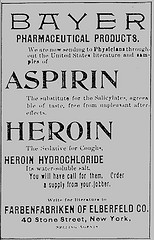Lawsuit Accuses Big Pharma Of Using Bogus Expiration Dates To Trick Customers Into Buying More Meds Image courtesy of (SA_Steve)

(SA_Steve)
The suit, filed in a a St. Louis, MO, County Circuit Court, alleges that Pfizer, Bayer, and Johnson & Johnson use “unconscionable, unfair, deceptive, unethical and illegal” methods to convince consumers that its drugs are useless after the expiration dates.
The complaint claims that “that if stored properly these medications can and do remain chemically stable, safe and effective long after those dates.”
There have been numerous studies in recent years showing that drug expiration dates do not provide an accurate date for when a medication has lost its efficacy. One study found that 88% of the medications it tested were still good at least one year after the expiration date, and that this stability period averaged 66 months beyond the expiration date. Some medicines have been found to be effective more than a decade after the expiration date.
“The purpose behind this scheme is to increase defendant’s sales and profits because consumers have to purchase replacement medications for those they have thrown out,” alleges the suit, which seeks to have the drug companies disclose how they come up with the expiration dates and to provide consumers with accurate information on how long these drugs are actually safe to use.
Classes Sue Drug Giants Over Expiration Dates [CourthouseNews.com]
Want more consumer news? Visit our parent organization, Consumer Reports, for the latest on scams, recalls, and other consumer issues.

